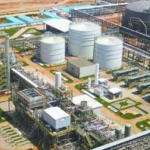Germany’s BASF, the world’s largest chemical company by revenue, has issued a warning about drastic consequences if gas supply from Russia is interrupted, German newspaper Frankfurter Allgemeine reported on Wednesday.
The German multinational chemicals giant warned that its European operations will be significantly disrupted if its gas supply is halved.
If gas supplies were to be cut in half, the Ludwigshafen plant – the largest chemical site in the world, which employs almost 40,000 people, would have to shut down, the paper quoted Michael Vassiliadis, chairman of a chemical trade union and a board member at BASF, as saying.
Explaining further, Vassiliadis said that if the gas supply was less than 50%, the site could no longer be operated stably, and will therefore have to be shut down completely.
- Read also;
- The U.S to release 1 million barrels of oil per day from reserves
- USA eases sanctions on Russian agricultural products including Fertilizers
Russian gas supply loss that is not compensated for would result in a dramatic effect on the chemical industry with outage costing, and hundreds f jobs lost over a relatively short period of time, he said.
BASF CEO Martin Brudermüller said earlier that there was no way to replace Russian gas in the short term but the group was working intensively on reducing its dependency on gas.
The report in the Frankfurter Allgemeine points out that the chemicals industry cannot run without oil and gas, and without the sector the economy stops, as people are heavily reliant on it in their everyday lives.
Petrochemical products account for 20% of clothing, 40% of cosmetic products and even 35% of aspirin, an essential in most families’ medicine cabinet.
BASF’s warning came as German government triggered the first stage of its national gas supply emergency plan over fears that Russia might soon cut supplies if it doesn’t receive payments from foreign buyers in rubles.
The EU gets roughly 40% of its natural gas from Russia. Following Russia’s military operation in Ukraine the bloc pledged to reduce its dependency on Russian energy, cutting it by two thirds this year and weaning off completely before 2030, replacing it by deliveries from other suppliers and renewables.
Nnamdi Maduakor is a Writer, Investor and Entrepreneur

























































